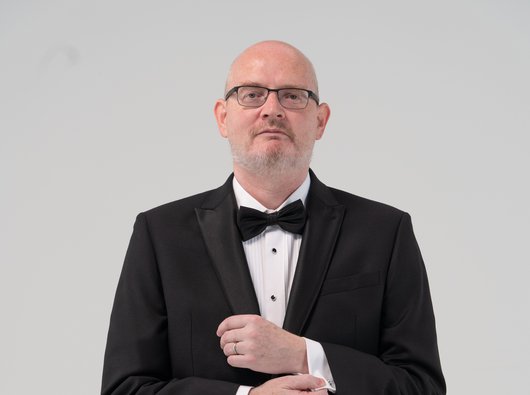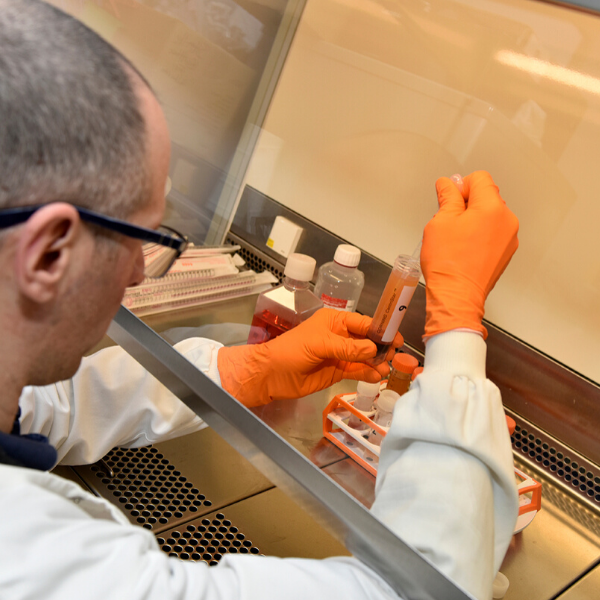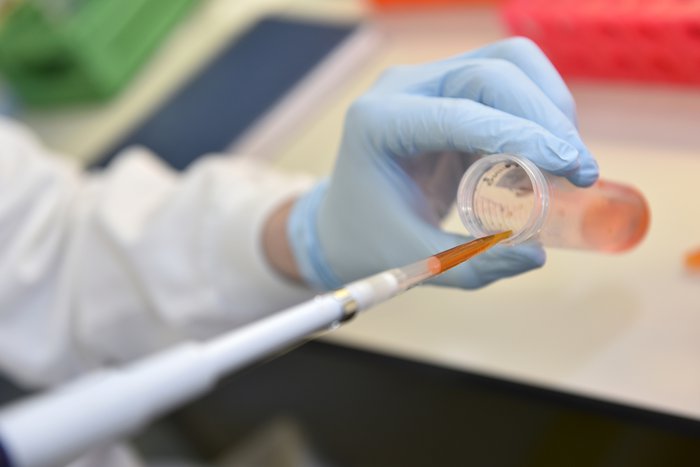The Road to Beating follicular lymphoma
Professor Jude Fitzgibbon
Professor Jude Fitzgibbon is a Professor of Personalised Cancer Medicine at Bart’s Cancer Institute in London and he Chairs the National Cancer Research Institute, Science sub-group in lymphoma. He specialises in follicular lymphoma and has worked in this area for over 20 years. In that time, he’s been involved with several studies that have pinpointed the genetic causes of the disease.
Jude has spent several years trying to understand how the disease changes over time, and why some people see their disease return. We spoke to him about how treatment has changed throughout his career and what more there is to do to get to a day where everyone with disease survives.

Treatments have changed things, but we still don’t have a cure
I started working on follicular lymphoma in 1998 when I arrived at Bart’s Cancer Institute as a young postdoctoral researcher. Treatment for the disease hasn’t changed much over the years, although the introduction of immune-chemotherapy such as R-CHOP (rituximab combined with chemotherapy drugs) led to a step change in the treatment of B cell lymphomas in the early 90s. Unfortunately, we don’t yet have curative treatments for follicular lymphoma, but many patients go into a long-term remission after they receive treatment and thankfully some patients never require treatment at all. The introduction of rituximab has also reduced the number of people who see their disease transform from slow growing follicular lymphoma to aggressive lymphoma from 30% of people to 10%.
Survival is improving, but it’s not enough
Today, around 80% of people diagnosed with follicular lymphoma will be alive beyond 10 years which is great, but it’s not enough. When someone is diagnosed with the disease, there is an expectation that they could endure periods of treatment, followed by a period of relapse, but with the burden of knowing that at some point their disease will return. We want to be able to get to a stage where people no longer relapse or require several rounds of treatment as this will improve the quality of life considerably.
There are several ways in which I think we’ll achieve this and at the moment I am working alongside Dr Jessica Okosun and Dr Dinis Calado on three main areas.

Homing in on the cells that cause the disease to return
Our research has shown that follicular lymphoma is most likely made up of two types of cells. The first is the active tumour we see in people who have enlarged lymph nodes. Then we think there is a much rarer population, called “the common progenitor cell (CPC)”, which can escape treatment that targets the active tumour and can continuously re-seed the disease, causing it to return. So, to cure follicular lymphoma, we need to be able to destroy these cells, too. We are now growing these CPC cells in the lab that we can then use to test drugs and see if they can destroy the cells and in doing so prevent follicular lymphoma from returning. We are also trying to look at what these cells are doing in people with the disease by collecting samples when people are in remission. We are confident that our research will unlock better approaches to eliminate these cells and potentially help us find cures for this and potentially other types of lymphoma.
Understanding why follicular lymphoma transforms into a more aggressive disease
When follicular lymphoma transforms into a more aggressive lymphoma, it can be hard to treat effectively. The hope is that by studying several people with follicular lymphoma and by taking samples of their cancer before and after they develop this aggressive type of lymphoma, we might be able to work out what makes this happen. The challenge is that there may not be just one specific factor that drives this switch, but many different ones. This is why it is very important to take a new biopsy when the disease has turned more aggressive.
Identifying patients who are unlikely to benefit from standard treatments
If a clinician knew with confidence that a patient’s tumour was unlikely to respond to conventional treatment, they would choose alternatives. This is important, as the earlier we can successfully treat cancer, the better. Several groups around the world, including in the UK, are working on this. They are taking samples from people with follicular lymphoma when they are diagnosed and throughout their treatment, to try to identify new markers that may tell clinicians if people are likely to enter a long and sustained remission after treatment or if they’re likely to relapse early. We are still searching for a perfect test that will allow us to predict outcomes early.
Understanding how much treatment someone needs
To get to a day where we beat blood cancer, we also need to work on limiting side effects for people with the disease. If we are unable to cure people completely and it remains that the disease will go through periods of requiring treatment and then periods of not, we need to work on reducing side effects to limit the effects on people’s quality of life. It might also be that people with the disease require different levels of treatment and as we start to understand more about the disease and the “good” players and the “bad” players, so we can tailor treatment and the intensity of treatment to the type of follicular lymphoma that person has.

A cure is on the cards
I am optimistic that a cure for follicular lymphoma is possible. New treatments like CAR-T cell therapy and other treatments that harness your immune system are promising and our current understanding of how follicular lymphoma behaves was unthinkable just 10 years ago. With this comes the prospect of chemotherapy free treatments, and therapies that might target the cells that are responsible for producing a constant stream of cancer cells, causing people to relapse from their disease.
Blood Cancer UK funded me over 10 years ago to work on a gene called EZH2 that is damaged in 25% of follicular lymphomas. It led to us working with industry to help create drugs that target this gene. These drugs are now available and licensed to treat follicular lymphoma. A small grant 10 years ago has supported work towards a licensed treatment. I think that shows what an impact investing in research can have, and that’s how we’ll beat blood cancer. It's coming up to 100 years since we first identified follicular lymphoma as an individual disease and thanks to research and charities like Blood Cancer UK, we know so much more about what the personality of the disease is and how to treat it. It certainly won’t be another 100 years to cure it.
Interested in hearing more?
Be the first to hear when we publish the next in the Road to Beating series
We will keep you updated about our work and the ways you can help, including campaigns and events. We promise to respect your privacy and we will never sell or swap your details.
